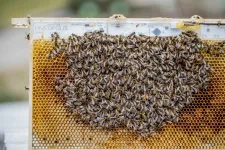(Press-News.org) March 23, 2023 – Despite the broad diversity of the U.S. population, dietary recommendations often overlook the positive contributions of cultural foods to build healthy dietary patterns. This is especially true when it comes to carbohydrate food guidance, where prevailing approaches have historically focused on only three components— carbohydrates, sugar, and dietary fiber—ignoring other important nutrient and cultural considerations. However, a new paper published in Nutrients highlights a more holistic approach, called the Carbohydrate Food Quality Score (CFQS), that is more culturally inclusive and aligns closer with the Dietary Guidelines for Americans.
“Unlike other approaches to evaluating carbohydrate quality, the CFQS evaluates the contribution of both under-consumed dietary components like potassium, dietary fiber and whole grains, and overconsumed nutrients like sodium, predominantly found in carbohydrate-containing foods, especially grains,” explained Judy Rodriguez, PhD, RDN, Professor Emerita in the Department of Nutrition and Dietetics at the University of North Florida, and coauthor of the study. “This nuance is significant, as it sheds light on the fact that carbohydrate-containing foods contain many important nutrients beyond carbohydrates. Furthermore, this tool is the only carbohydrate quality index that aligns with the Dietary Guidelines for Americans.”
How It Works
The development and validation of the CFQS is described in two previously published articles.1,2 In brief, this new system is based on similar foundations of previously published approaches that focus on fiber, sugar and total carbohydrate content of foods. However, CFQS also acknowledges the heterogeneity, nutrient and cultural diversity across the carbohydrate food category by:
1) Including other nutrients like sodium, potassium, and whole grain (for grain-based foods) in the scoring system.
2) Creating two distinct scoring systems: one for non-grain foods (CFQS-4), and one for grain-based foods (CFQS-5). CFQS-4 is scored on a 4-point scale based on the amounts of carbohydrates, sugar, sodium and potassium. CFQS-5 is scored on a 5-point scale, using the same 4 components as CFQS-4, plus whole grains.
“The new CFQS clearly recognizes that carbohydrate foods are not homogenous, and nuance is needed when communicating this to consumers. For example, while potatoes and grain-based foods are considered ‘carb foods’ and contribute important nutrients to the diet, their nutrient profiles and quality vary. The CFQS can help identify those foods that can be chosen frequently as dietary staples,” stated Dr. Rodriguez.
Not only do the metrics help to clarify and quantify carbohydrate food quality, but they also support health equity among all Americans as they can be applied across a variety of budgets, lifestyles, and cultures.
Why it Matters
Dietary guidelines continue to emphasize the importance of total dietary patterns and overall diet quality. However, many tools intended to help people build healthy dietary patterns continue to categorize individual foods as ‘good’ or ‘bad’. The CFQS is meant to break this cycle by providing a spectrum of carbohydrate food choices rather than assigning binary classifiers to food choices (e.g., good/bad, eat/avoid) and simplistic food classifications such as ‘eat a rainbow’ (e.g., dark green, red and orange, etc.) While such systems can be helpful, they are confusing when it comes to foods with neutral colors such as white cauliflower, daikon, jicama, potatoes, brown mushrooms, and black beans. Not only can the CFQS help eliminate confusion, but it aligns with the Dietary Guidelines for Americans as it recognizes other essential nutrients that are under- or over-consumed in the American diet and predominately delivered through carbohydrate-containing foods.
"The CFQS provides a vehicle that affirms with each individual’s values, socioeconomics, and food and cultural traditions, and provides a scale to help address nutritional concerns about the diet,” explained Julie Miller Jones, PhD, LN, CNS, professor emerita in the Department of Family, Consumer and Nutritional Sciences at the St. Catherine University in St. Paul, and coauthor of the study. “The CFQS can reassure consumers of the role of carbohydrate foods for constructing healthy eating patterns and while affirming equitable, nutritious, and culturally appropriate food choices to influence health.”
Disclosures: The Quality Carbohydrate Coalition (QCC) is a multi-stakeholder engagement of commodity groups across the food industry. Guided by the work of its Scientific Advisory Council (SAC), this group aims to support a collaborative, scientific dialogue around the unique and diverse roles that carbohydrate-containing foods play in healthful eating. The council is made up of six world-renowned experts in carbohydrate research, nutrient profiling, cultural competency and epidemiology: Judith Rodriguez, PhD, RDN; Adam Drewnowski, PhD; Julie Miller Jones, PhD, LN, CNS; Joanne Slavin, PhD, RDN; Siddhartha Angadi, PhD; and Yanni Papanikolaou, MPH. Potatoes USA provides the funding to support the research being conducted by the SAC.
Additional Details on Study Design, Strengths, and Limitations
Three one-day menu models were developed to demonstrate the utility of the CFQS models when selecting carbohydrate foods as part of a healthy dietary pattern. Menu models adhered to nutritional requirements outlined in the following dietary patterns established by the 2020-2025 Dietary Guidelines for Americans:
Healthy US
Healthy Mediterranean-Style
Healthy Vegetarian
A fourth menu model was developed in alignment with the USDA Thrifty Food Plan to demonstrate the utility of the CFQS in budget-conscious healthy eating.
All four menu models were created using ESHA Food Processor menu modeling software, and each menu adhered to a 2,000 kcal diet including three meals and two snacks. While carbohydrate foods with a CFQS of three or greater were prioritized, scores of one and two were also included to demonstrate their nutritional contributions to healthy, diverse, affordable and culturally appropriate food patterns.
Finally, four tables were created to reflect carbohydrate foods commonly found across the largest recorded ethnic groups in the United States:
African American
Latino/Latin America
Asian American
Native American
The purpose of these tables was to demonstrate how culturally inclusive food patterns can be integrated with DGA-recommended dietary patterns and the CFQS models.
The present modeling exercises demonstrate the feasibility of using carbohydrate food quality score models (CFQS-4 and CFQS-5) to better understand the value and variability of carbohydrate food quality across different food groups and different dietary patterns. The models were previously validated, and the current work demonstrates their applicability and utility across culturally and economically diverse eating patterns. However, the current work cannot show the effects of implementing CFQS models on specific health outcomes. Thus, future research will need to examine the health impacts of consuming higher scoring CFQS dietary patterns compared to lower scoring patterns. Furthermore, while the CFQS metrics emphasize nutrients of public health concern, the scoring system omits other key factors associated with health, such as bioavailability of nutrients, content of other nutrients, and contributions from bioactive phytonutrients (e.g., antioxidants, prebiotics, and probiotics). Future research will inform further development of the existing models to reflect these important components.
References
1. Comerford KB, Papanikolaou Y, Jones JM, et al. Toward an Evidence-Based Definition and Classification of Carbohydrate Food Quality: An Expert Panel Report. Nutrients. 2021;13(8). doi:10.3390/NU13082667
2. Drewnowski A, Maillot M, Papanikolaou Y, et al. A New Carbohydrate Food Quality Scoring System to Reflect Dietary Guidelines: An Expert Panel Report. Nutrients. 2022;14(7). doi:10.3390/NU14071485
END
Beyond ‘good vs. bad’ – A new, more comprehensive approach to evaluate carbohydrate quality and improve health equity
The Carbohydrate Food Quality Score offers a novel carbohydrate scoring strategy that is culturally inclusive and aligns with the Dietary Guidelines for Americans
2023-03-23
ELSE PRESS RELEASES FROM THIS DATE:
Robotic system offers hidden window into collective bee behavior
2023-03-23
Honeybees are famously finicky when it comes to being studied. Research instruments and conditions and even unfamiliar smells can disrupt a colony’s behavior. Now, a joint research team from the Mobile Robotic Systems Group in EPFL’s School of Engineering and School of Computer and Communication Sciences and the Hiveopolis project at Austria’s University of Graz have developed a robotic system that can be unobtrusively built into the frame of a standard honeybee hive.
Composed of an array of thermal sensors and actuators, the system measures and modulates honeybee behavior through ...
Octapharma USA grant supports PANS/PANDAS education event at NHIA Conference March 27 in Washington, D.C.
2023-03-23
PARAMUS, N.J. (March 23, 2023) – Octapharma USA has provided a grant for an educational program on pediatric acute-onset neuropsychiatric syndrome (PANS) and PANDAS, a subset of PANS associated with strep, to be held during the National Home Infusion Association (NHIA) Annual Conference scheduled for March 25 – 27 in Washington, D.C.
Octapharma is enrolling more patients and sites for its phase 3 multicenter superiority study comparing the effectiveness of panzyga® (immune globulin intravenous, human - ifas) 10% liquid preparation versus placebo ...
Scientists warn of rise in potentially fatal bacterial infection due to global warming
2023-03-23
Continued warming of the climate would see a rise in the number and spread of potentially fatal infections caused by bacteria found along parts of the coast of the United States.
Vibrio vulnificus bacteria grow in warm shallow coastal waters and can infect a cut or insect bite during contact with seawater. A new study led by the UK’s University of East Anglia (UEA) shows that the number of V. vulnificus infections along the East Coast of the US, a global hotspot for such infections, has gone ...
UTSA researchers exploit vulnerabilities of smart device microphones and voice assistants
2023-03-23
(SAN ANTONIO) MARCH 23, 2023 - Guenevere Chen, an associate professor in the UTSA Department of Electrical and Computer Engineering, recently published a paper on USENIX Security 2023 that demonstrates a novel inaudible voice trojan attack to exploit vulnerabilities of smart device microphones and voice assistants — like Siri, Google Assistant, Alexa or Amazon’s Echo and Microsoft Cortana — and provide defense mechanisms for users.
The researchers developed Near-Ultrasound Inaudible Trojan, or NUIT (French for “nighttime”) to study how hackers exploit speakers and ...
Without this, plants cannot respond to temperature
2023-03-23
UC Riverside scientists have significantly advanced the race to control plant responses to temperature on a rapidly warming planet. Key to this breakthrough is miRNA, a molecule nearly 200,000 times smaller than the width of a human hair.
With moderate increases in temperature, plants grow taller to avoid hotter ground and get fresher air. A landmark study published in the journal Nature Communications demonstrates that microRNA or miRNA is required for this growth. The study also identifies which miRNA molecules — out of more than 100 possibilities — are the essential ones.
“We found that without miRNA plants will not grow, even ...
Use of melatonin linked to decreased self-harm in young people
2023-03-23
Medical sleep treatment may reduce self-harm in young people with anxiety and depression, an observational study from Karolinska Institutet in Sweden suggests. The risk of self-harm increased in the months preceding melatonin prescription and decreased thereafter, especially in girls. The study is published in The Journal of Child Psychology and Psychiatry.
Melatonin is a hormone that controls the sleep-wake cycle and is the most commonly prescribed drug for sleep disturbances in children and adolescents in Sweden. Melatonin use has dramatically increased in recent years, and it is available over the counter in Sweden since 2020.
“Given the established link between sleep ...
Pressure-based control enables tunable singlet fission materials for efficient photoconversion
2023-03-23
Applying hydrostatic pressure as an external stimulus, Tokyo Tech and Keio University researchers demonstrate a new way to regulate singlet fission (SF), a process in which two electrons are generated from a single photon, in chromophores, opening doors to the design of SF-based materials with enhanced (photo)energy conversion. Their method overrides the strict requirements that limit the molecular design of such materials by realizing an alternative control strategy.
Singlet fission (SF) is a process in which ...
New wood-based technology removes 80% of dye pollutants in wastewater
2023-03-23
Researchers at Chalmers University of Technology, Sweden, have developed a new method that can easily purify contaminated water using a cellulose-based material. This discovery could have implications for countries with poor water treatment technologies and combat the widespread problem of toxic dye discharge from the textile industry.
Clean water is a prerequisite for our health and living environment, but far from a given for everyone. According to the World Health Organization, WHO, there are currently over two billion people living with limited or no access to clean water.
This global challenge ...
Optical switching at record speeds opens door for ultrafast, light-based electronics and computers
2023-03-23
Imagine a home computer operating 1 million times faster than the most expensive hardware on the market. Now, imagine that level of computing power as the industry standard. University of Arizona researchers hope to pave the way for that reality using light-based optical computing, a marked improvement from the semiconductor-based transistors that currently run the world.
"Semiconductor-based transistors are in all of the electronics that we use today," said Mohammed Hassan, assistant professor of physics and optical sciences. "They're part of every industry – from kids' toys to ...
Depressed, and aging fast
2023-03-23
Older adults with depression are actually aging faster than their peers, UConn Center on Aging researchers report.
“These patients show evidence of accelerated biological aging, and poor physical and brain health,” which are the main drivers of this association, says Breno Diniz, a UConn School of Medicine geriatric psychiatrist and author of the study, which appears in Nature Mental Health on March 22.
Diniz and colleagues from several other institutions looked at 426 people with late-in-life ...
LAST 30 PRESS RELEASES:
Why chronic pain lasts longer in women: Immune cells offer clues
Toxic exposure creates epigenetic disease risk over 20 generations
More time spent on social media linked to steroid use intentions among boys and men
New study suggests a “kick it while it’s down” approach to cancer treatment could improve cure rates
Milken Institute, Ann Theodore Foundation launch new grant to support clinical trial for potential sarcoidosis treatment
New strategies boost effectiveness of CAR-NK therapy against cancer
Study: Adolescent cannabis use linked to doubling risk of psychotic and bipolar disorders
Invisible harms: drug-related deaths spike after hurricanes and tropical storms
Adolescent cannabis use and risk of psychotic, bipolar, depressive, and anxiety disorders
Anxiety, depression, and care barriers in adults with intellectual and developmental disabilities
Study: Anxiety, gloom often accompany intellectual deficits
Massage Therapy Foundation awards $300,000 research grant to the University of Denver
Gastrointestinal toxicity linked to targeted cancer therapies in the United States
Countdown to the Bial Award in Biomedicine 2025
Blood marker from dementia research could help track aging across the animal world
Birds change altitude to survive epic journeys across deserts and seas
Here's why you need a backup for the map on your phone
ACS Central Science | Researchers from Insilico Medicine and Lilly publish foundational vision for fully autonomous “Prompt-to-Drug” pharmaceutical R&D
Increasing the number of coronary interventions in patients with acute myocardial infarction does not appear to reduce death rates
Tackling uplift resistance in tall infrastructures sustainably
Novel wireless origami-inspired smart cushioning device for safer logistics
Hidden genetic mismatch, which triples the risk of a life-threatening immune attack after cord blood transplantation
Physical function is a crucial predictor of survival after heart failure
Striking genomic architecture discovered in embryonic reproductive cells before they start developing into sperm and eggs
Screening improves early detection of colorectal cancer
New data on spontaneous coronary artery dissection (SCAD) – a common cause of heart attacks in younger women
How root growth is stimulated by nitrate: Researchers decipher signalling chain
Scientists reveal our best- and worst-case scenarios for a warming Antarctica
Cleaner fish show intelligence typical of mammals
AABNet and partners launch landmark guide on the conservation of African livestock genetic resources and sustainable breeding strategies
[Press-News.org] Beyond ‘good vs. bad’ – A new, more comprehensive approach to evaluate carbohydrate quality and improve health equityThe Carbohydrate Food Quality Score offers a novel carbohydrate scoring strategy that is culturally inclusive and aligns with the Dietary Guidelines for Americans




